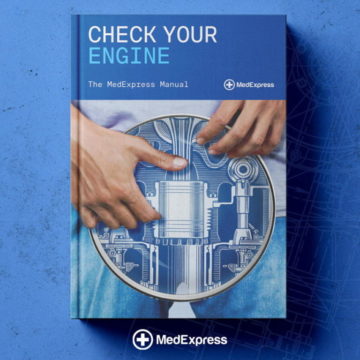Britain’s got pied. Porn induced erectile dysfunction. However, our research has revealed it’s nothing to be ashamed about. In fact, it’s really common. The data shows that almost two-thirds of UK men (64%) believe that porn has caused them issues with erectile dysfunction, with almost one in six citing it as the main cause (14%). This raises the bigger question about the widespread impact porn is having on men’s sexual health as well as their overall well-being across the UK.
From the success of sites like OnlyFans and PornHub, to the alarming rise in illegal deepfakes, porn is becoming increasingly more accessible in the digital age. And while pornography is far from new, it has seen an astronomical rise in consumption worldwide in recent years.
Between August 2024 – August 2025, Google searches for ‘porn’ worldwide hit a decade-high, reaching 8.93 billion, soaring by 40% in just two years. UK-specific data follows this same sentiment, seeing searches for ‘porn’ surge from 529 million in 2022–2023 to 662 million in 2024–2025 — a 25% YOY increase.
So, with accessibility on the rise and searches likely to continue climbing, MedExpress conducted a nationwide representative survey of UK men to uncover the true impact porn is having on the sex lives of Britain to help raise awareness and reduce the stigma associated with porn-induced erectile dysfunction.
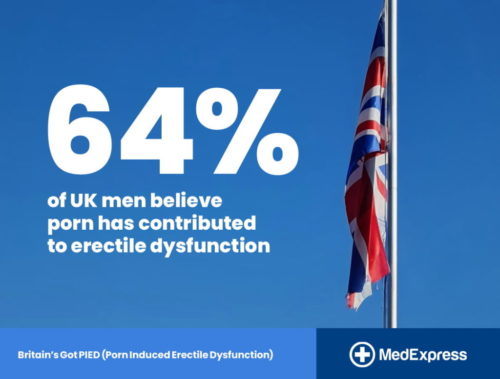
The Prevalence Of Porn Among UK Men And Its Impact On Sex And Relationships
Porn is fully integrated into British society, with our analysis revealing that more than four in five men in the UK (82%) watch it. However, what was more shocking was the age at which men were first exposed to this content.
With the current age restrictions at 18+, a third of British men surveyed (34%) admitted they first accessed pornography before the age of 15, with some even admitting they accessed it before the age of ten.
This early exposure only poses the question of the role in which porn has influenced their view of sex and relationships, and how it’s impacted them as they entered into adulthood.
The impact porn has on the sex lives and relationships of UK men
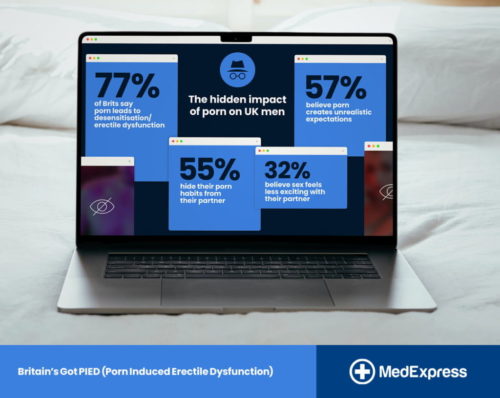
Our survey revealed that more than half (59%) of male Brits said they felt porn negatively impacted their relationship and sex life. More specifically:
- 57% revealed that porn set unrealistic expectations in the bedroom.
- 55% of men hide their porn habits from their partners.
- 32% admit sex with a partner (previous or current) has felt less exciting due to porn consumption.
- 19% found porn increased insecurities about their body and performance.
- 17% believe porn distracts from being present with their partner.
The survey also revealed, however, that it’s not just the relationships with others that are affected, but themselves.
62% of men admit their mental health has also taken a toll due to the media they are exposing themselves to. Respondents reported guilt, shame, and addiction, alongside lower self-esteem and concentration.
Many said porn fuels unrealistic expectations about sex and relationships, impacting real-life intimacy, and others admitted it leads to intrusive thoughts, objectification, and reduced satisfaction with partners – sometimes even a loss of interest in sex altogether.
Which UK city has the biggest obsession with porn?
Learning the impact consistent and problematic porn consumption can have on male health, we looked to uncover which cities were searching for porn the most. To conduct this research, we analysed ten of the top porn-related searches per city in the UK, ranking the total number of annual Google searches against per capita data to reveal where in the UK is watching it the most.
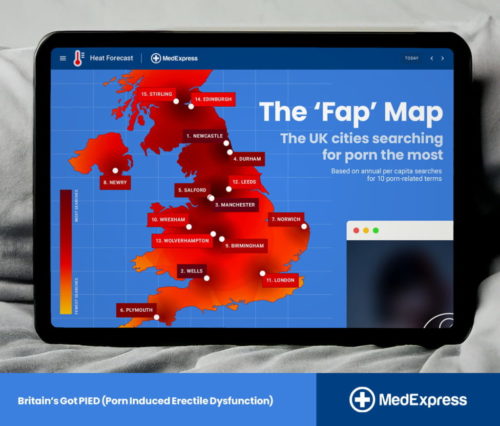
Newcastle upon Tyne tops the list as the UK’s most porn obsessed city. The data revealed that residents of Newcastle search for porn related searches on average 629,260 times – that’s more than three times the entire population of the city. Put another way, that’s around 3.3 searches per resident every month, or almost 40 searches per person each year.
In second place follows Wells in Somerset, averaging 2.9 monthly searches per person. Meanwhile, northern stronghold Manchester concludes the top three UK cities most obsessed with porn, averaging 2.5 monthly searches per person.
The 10 most ‘porn obsessed’ cities in the UK
| Rank | City | Average monthly Google searches for key porn terms | Average monthly searches per person |
| 1 | Newcastle upon Tyne | 629,260 | 3.27 |
| 2 | Wells | 32,900 | 2.90 |
| 3 | Manchester | 997,140 | 2.52 |
| 4 | Durham | 109,740 | 2.30 |
| 5 | Salford | 163,200 | 2.24 |
| 6 | Plymouth | 513,420 | 1.97 |
| 7 | Norwich | 419,050 | 1.97 |
| 8 | Newry | 52,610 | 1.90 |
| 9 | Birmingham | 1,811,640 | 1.84 |
| 10 | Wrexham | 117,300 | 1.79 |
Cambridge was revealed to be the least porn-obsessed city in the UK, averaging only 0.06 monthly searches per resident, followed by Nottingham (0.08), Newport (0.09) and Carlisle (0.15).
| Rank | City | Average monthly Google searches for key porn terms | Average monthly searches per person |
| 63 | York | 69,260 | 0.45 |
| 64 | Exeter | 46,240 | 0.39 |
| 65 | Preston | 109,910 | 0.35 |
| 66 | Southampton | 84,500 | 0.34 |
| 67 | Craigavon | 16,970 | 0.29 |
| 68 | Leicester | 117,020 | 0.23 |
| 69 | Sunderland | 60,230 | 0.18 |
| 70 | Carlisle | 12,080 | 0.15 |
| 71 | Newport | 26,680 | 0.09 |
| 72 | Nottingham | 60,260 | 0.08 |
| 73 | Cambridge | 9,210 | 0.06 |
Where are Brits consuming porn, and why?
Watching porn is largely considered something to be consumed behind closed doors, with our study finding that 91% of men who watch it admit they do so at home. However, our data has also found that it is not the only place where they consume it.
29% of male Brits have watched porn at a partner’s home, potentially behind their back, while 20% have also watched porn at a friend’s or family member’s house. However, more alarmingly, the data reveals that more than a third of male Brits (36%) admit to watching porn in public spaces:
- 17% have watched porn at work
- 14% have watched porn in public bathrooms
- 5% have watched porn on public transport
Doctor Sophie Dix comments on the findings:
“The number of Brits consuming porn in public is alarming due to the nature of consumption. Watching porn in public suggests that it is moving beyond casual pleasure and entertainment into dependency, which can significantly increase the risk of developing PIED – porn induced erectile dysfunction.
Excessive and compulsive porn use will encourage desensitisation of sexual responses, driving a need for more frequent, excessive and extreme content, which can escalate sexual and mental health issues.”
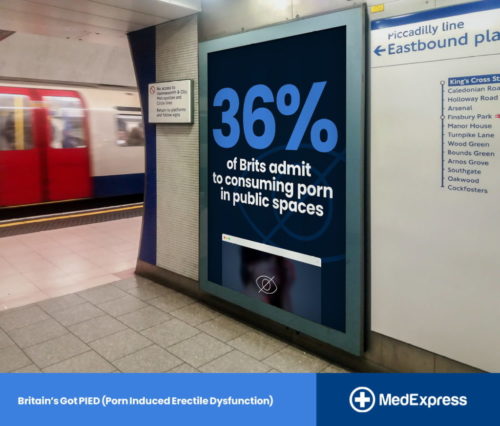
When asked why individuals may be turning to porn, the most common reasons were:
- 68% because they feel horny
- 45% because they feel stressed
- 34% because they feel bored
- 14% to boost productivity
With hectic modern lives and ‘burnout’ being a prevalent movement among UK workers, it’s somewhat unsurprising that over two-fifths of Brits consume porn to de-stress.
What is interesting, however, is the correlation to productivity. The data revealed that almost one in six Brits turns to porn to help increase their productivity. This poses the question: when are people watching porn during the day, and has the rise of working from home since COVID-19 contributed to the UK’s growing porn consumption?
The most popular times to consume porn
Research commissioned by Ofcom’s Online Nation report[1] found that 21% of the 13.8 million adults who watch pornography in the UK did so during 9 am to 5:30 pm – the classic working day. Their research also highlighted that they spent an average of 55 minutes on adult websites during this time.
This data correlates with our internal research of the ten most-searched porn-related terms, finding that during the classic work hours, 9 am was the most popular time of day across the board, followed by 10 am in second place, and 4 pm in third place.
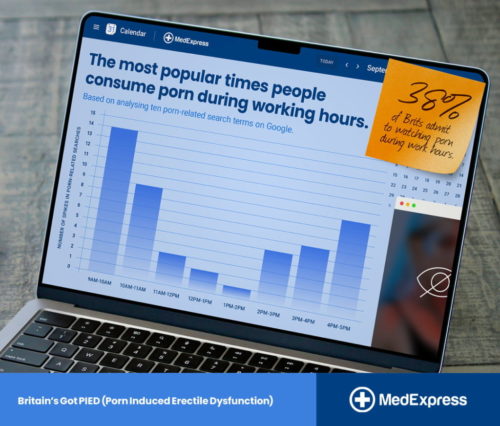
Is WFH culture impacting the UK’s porn habits?
Overall, our study found that 38% of men in the UK admit to watching porn during their work hours. But has the recent ‘working from home’ culture exacerbated their habits? The simple answer – yes.
Our data found that over a third of Brits (31%) say working from home has influenced their porn consumption, with 17% admitting that the flexibility of WFH has actually increased their viewing. Isolation at home was also a factor, with 14% citing it as a reason for higher consumption. However, they also believe it’s making them more productive.
Interestingly, 44% of Brits feel that watching porn and masturbating during the workday has made them more productive. A clear example of Brits turning to porn for productivity can be seen in the search data: Monday at 3 pm showed a clear spike in porn-related searches, aligning with the infamous “3 pm slump.”
This raises a question: Should sexual health, including masturbation, be considered part of workplace wellness routines? With our study revealing six in ten Brits would support the idea of ‘sex days’ at work (paid time off to prioritise sexual intimacy, wellness and health), similar to initiatives in Tokyo aimed at boosting the population and sexual well-being, it seems the conversation is opening up in 2025.
Doctor Sophie Dix, Head of Medical Affairs at MedExpress, comments on the potential benefits of integrating sexual wellbeing into daily work life:
“Masturbation is a very normal and healthy way to relieve stress and could be used as a great tool to help improve productivity and focus at work. It helps release endorphins, the feel-good hormone, which in turn will benefit your mood and productivity. So yes, ‘masturbation breaks’ could be something people can look to implement at home, so long as it doesn’t get in the way of other responsibilities.
“The potential to incorporate sexual wellbeing discussions regarding workplace wellness could also help destigmatise these natural behaviours and overall help contribute to mental and emotional health. However, it must ensure that it’s about supporting individual wellbeing with respect to any professional boundaries and privacy.”
The future landscape of pornography
When asked what men believe is driving the rise in male porn consumption, 43% of UK men pointed to AI, deepfakes, and adult influencers.
COVID marked the beginning of a huge boom in adult online creators, supercharging the porn industry, with 62% of male Brits admitting they have subscribed to adult influencers on sites like OnlyFans. Meanwhile, AI-generated deepfakes are the latest development to hit the digital world, with nearly half of Brits (49%) having already been exposed to illegal deepfake porn, knowingly or unknowingly.
More controversially, more than a quarter of UK men (26%) admitted they would consider AI-driven sexual gratification, with married men most likely to embrace this technology.
Together, these booming trends are only set to exacerbate the issues surrounding porn-induced erectile dysfunction (PIED) in the UK and highlight the urgent need to have greater awareness and actionable legislation on the nation’s future porn consumption.
How do we reduce the impacts of porn on the nation?
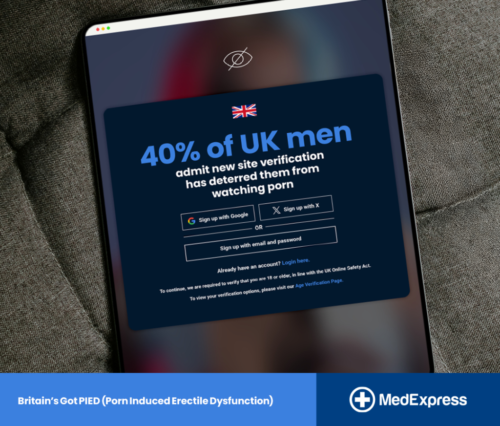
With many men exposed to porn from a young age and having decades of instant access at their fingertips, consumption is often just a deeply ingrained habit, so reducing accessibility is key. Fortunately, for many, this is a behaviour that can be unlearned and trained out of the system.
Research suggests it takes around 90 days for the brain to rewire and break a behavioural pattern. Encouragingly, 74% of male Brits we surveyed believed they could give up porn for this 90-day period, though more than one in four (26%) still admitted they don’t think they could overcome the habit. This is where we, as a society, can help implement strategic measures to help reduce porn’s impact on men’s sexual health and well-being.
One such measure already taking action is the UK’s Online Safety Act, which came into effect on 25th July 2025, requiring all adult content platforms to introduce robust age verification checks. The rollout is already having an effect, and not just on underage users. According to data analytics from SimilarWeb, PornHub lost more than one million visitors in just two weeks.2
Our study also highlighted this trend, with 40% of male Brits saying the new verification process has deterred them from consuming porn. This reluctance is likely tied to a desire for anonymity and may be especially relevant to the 34% who admit to watching porn out of boredom. Highlighting how implementing simple laws and measures to reduce accessibility can have a huge impact on the habits of Britain.
Doctor Sophie Dix comments on how she believes porn consumption can be reduced:
“In my opinion, the first step in reducing consumption of pornography is increasing awareness and education. Many individuals are still not fully aware that excessive exposure to pornography can damage both physical and mental health. We are seeing more evidence linking increased porn consumption to erectile dysfunction and desensitisation, diminishing sexual satisfaction and intimate relationships.
“Ultimately, reducing porn consumption requires awareness, support and a willingness to develop healthier patterns of connection. The next step is accountability—ensuring that, as a society, we continue to strengthen and implement the necessary laws and legislation to limit accessibility to pornographic material to help safeguard future generations from potential harm to their sexual and mental well-being.”
For those suffering from prolonged erectile dysfunction or desensitisation, it is important to consult with your doctor for professional advice. While seeking medical advice can sometimes feel daunting to some, healthcare professionals are trained to provide the most tailored support and treatment in a respectful and judgment-free environment.
For those who find in-person consultations intimidating, reputable online services such as MedExpress offer confidential health assessments and access to appropriate treatments online.
Methodology
We conducted a nationwide representative survey, with 600 male Brits surveyed on their feelings and opinions on porn consumption.

